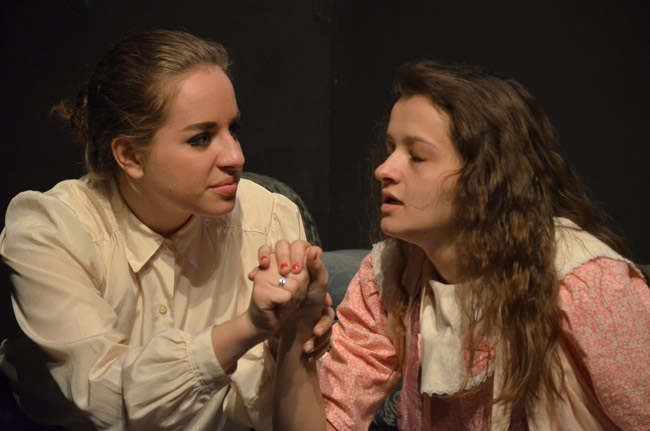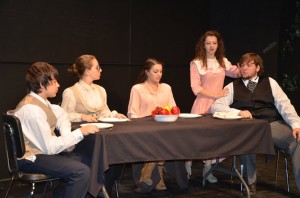
Brace yourself: the violence between Agata Sokolska and Leana Gardella might unnerve you. Sokolska is a junior at Flagler Palm Coast High School, Gardella is a senior, and the two are on stage, in the lead roles for “The Miracle Worker,” which opens tonight at the Black Box Theatre at FPC. But the intimacy of their struggle, the slaps, the punches, the spitting, the tussling and the sheer hatred will transport you back to the most famous women’s wrestling match in history until then—the month-long battle between Helen Keller (played by Sokolska) and her teacher, Annie Sullivan (Gardella), until that famous miracle at the pump, when Keller finally made the connection between words and objects, and the world opened its eyes on her again.
This is no easy play pull off, and it may even be difficult to watch at times: Sokolska, who has all but one line in the entire play, may not have known Gilda Radner, but the physicality of her performance fills the stage like that of the late Saturday Night Live actress, whose physical abilities were one water-pump scene after another. Gardella meanwhile has to carry the bulk of the spoken dialogue: she speaks for both characters on stage for much of the play, verbalizing her own and Keller’s frustrations while giving as good as she gets from Keller’s distempers.
Few people are unaware of the story: Helen Keller was born a normal child in 1880 Alabama, and for 18 months, she developed as one. “Then,” she wrote, “came the illness which closed my eyes and ears and plunged me into the unconsciousness of a newborn baby.” She could no longer hear, speak or see. Her parents hired Anne Sullivan when Helen was 7 years old. Sullivan, who’d had her own struggles with vision, was to be Helen’s teacher. She became her re-creator, freeing her of the prison she’d been in all those years. The transformation actually took place in a mere month. A half-century friendship between Keller and Sullivan endured after that, including in the Keller-Sullivan vaudeville act, as did Keller’s own celebrated life as a Socialist (don’t tell tea party fans), life-long fund-raising for the blind, and as a writer and lecturer. Every president from Grover Cleveland to John F. Kennedy welcomed her at the White House, and in 1964, Lyndon Johnson conferred on her the Presidential Medal of Freedom. She died in 1968.
“The Miracle Worker,” of course—the play was written by William Gibson in 1957 and staged on Broadway in 1959, with Ann Bancroft and Patty Duke (Duke was Keller)—is about that one month in the couple’s life.

“I had been in the show,” Nelson says. “I was Helen in high school and I knew what the demands were, and this being the opening show, because this is my first year here, the opening show had already been chosen [that was “13 Past Midnight”], so I wanted one that I really would be attached to, to start, and I had some basis in knowing. The other fact was I knew some of the cast that was here, I had seen some of the shows and worked with some of the kids in ‘Hairspray,’ so I knew some of them and I knew physically what they could handle as actresses. Up to that point they had some very strong male actors who had taken the leads in a lot of things, and I thought, I know I have some strong females, and while I have the people who can handle the show, I want to do it.”
Nelson had worked with Sokolska and Gardella in “Talking With” (at City Repertory) and “Hairspray” (at the Playhouse), and the two students had a built-in chemistry going back years.
“This girl right here is incredible because if it weren’t for her I really would not be able to do this,” Gardella says of Sokolska. The two had just finished a first act rehearsal, culminating in that famous breakfast scene where Keller chomps from plate to plate until Sullivan decides to teach her proper manners, and all hell breaks loose between the two: silverware, plates, fists and bodies fly. They have the bruises to prove it. “She and I, of course we’ve been friends for a very long time, so it’s so much easier,” Gardella continues. “We didn’t have to worry about that chemistry because we already have it. And it’s so much easier to work with her because she is so professional, and it’s just—it happens with her, it just first and it works, and when I have to say something because she does something, she does it, she never misses it, she’s always there, always on top of everything, which makes all this so much easier to do.”
Gardella adds: “I love Annie because she’s so much like a spitfire. She doesn’t take crap from anyone, and she knows that there’s something in her, there’s something in Helen, and she knows that she can get through to her. She doesn’t know how, but she knows that she has to. So I just love that determination. I find Annie inspirational and I find Helen inspirational because of what she had to go through.”
For Sokolska, the challenge is to make it through the play literally without a word, but being just as convincing without speech. She’s been in innumerable plays. This is her hardest. “I have to be really believable that I’m blind and that I don’t understand what she’s trying to let me understand and things like that,” Sokolska says. “So, I have subtext for my actions. If she’s like, trying to get the doll away from me, I’m—don’t touch that, that’s supposed to be mine, I try to act very selfish toward myself. When I don’t like people touching me, or taking my doll, or trying to get me to eat food from a plate, from a spoon, so it’s a lot of subtext and thinking what I’m doing, and feeling like Hellen Keller would be thinking at the moment.”
Talk about subtext: Nelson’s transition wasn’t easy, either. She was the permanent replacement for Ed Koczergo, the beloved and mercurial drama teacher of four years who was at the center of the controversy over “To Kill a Mockingbird” (which school authorities unwisely banned before reversing their decision) before he abruptly quit early last spring. The program was led by Mary Beale immediately after Koczergo’s departure. Beale was herself shafted out of the job. And Nelson was brought in.
“It was very difficult,” Nelson says. “I had a lot of people who didn’t like me from the start before they even met me, and of course everyone loved Mr. K. Mr. K was a wonderful man, a great director, so that was some big shoes to fill for me, with it being my first time teaching theater, but it’s been wonderful by the same token. The kids are great.”
It was no small thing, either, that Jack Neiberlein, the Flagler Auditorium’s technical director and wizard, was injured (the injury was not related to the play), and his role had to be improvised by students: in stepped Foster Langford (who’s also the senior Keller in the play), Donald Gitcher at the sound board and others to reconstruct the Neiberlein wizardry.
So “The Miracle Worker”’s subplots extend beyond the script in many ways, including, and especially, in ways that have nothing to do with that transition and everything to do with the play’s enduring relevance. “To me it’s the inspiration,” Nelson says, “because there are a lot of kids today who get labeled. This kid can’t do this—you see teachers do it all the time, you came from this family, you’re too stupid, maybe their parents tell them that, maybe they think, because of their background or whatever, and here is this girl who has what they consider nothing. Well, we’re going to have to put her away in an asylum, that’s our only hope for her, and this woman comes in and teaches her language, and how to speak. I mean, she was verbalizing by the end, that she could actually, physically talk. So it’s inspirational that you can overcome sometimes what you think is just the biggest obstacle.”
![]()
“The Miracle Worker,” directed by Kelly Nelson, will be staged at Flagler Palm Coast High School’s Black Box Theatre (adjacent to the Auditorium) Thursday, Feb. 16 and Friday, Feb. 17 at 7 p.m., and Saturday, Feb. 18 at 2 and 7 p.m. Tickets are $12 for adults, $8 for students. See below for the full program, including cast and credits.
The Miracle Worker: Cast, Crew and Program





























John Sbordone says
Two great young actresses and a wonderfully savvy director…. whats not to love. Break a leg! I can’t wait to see it Saturday.
Lisa Gardella says
OKAY if you want to really be entertained — literally! You’ll laugh, you’ll cry, you’ll be amazed at the talent of these HIGH SCHOOL kids! Go See Miracle worker tonight & tomorrow at 7pm and if you are a teacher you can see it half price tomorrow at 2!
Foster Langford says
My Boss Mr.N is a wizard?
Women’s wrestling?
also Annie and Helen did not hate each other, well Annie didnt hate Helen.